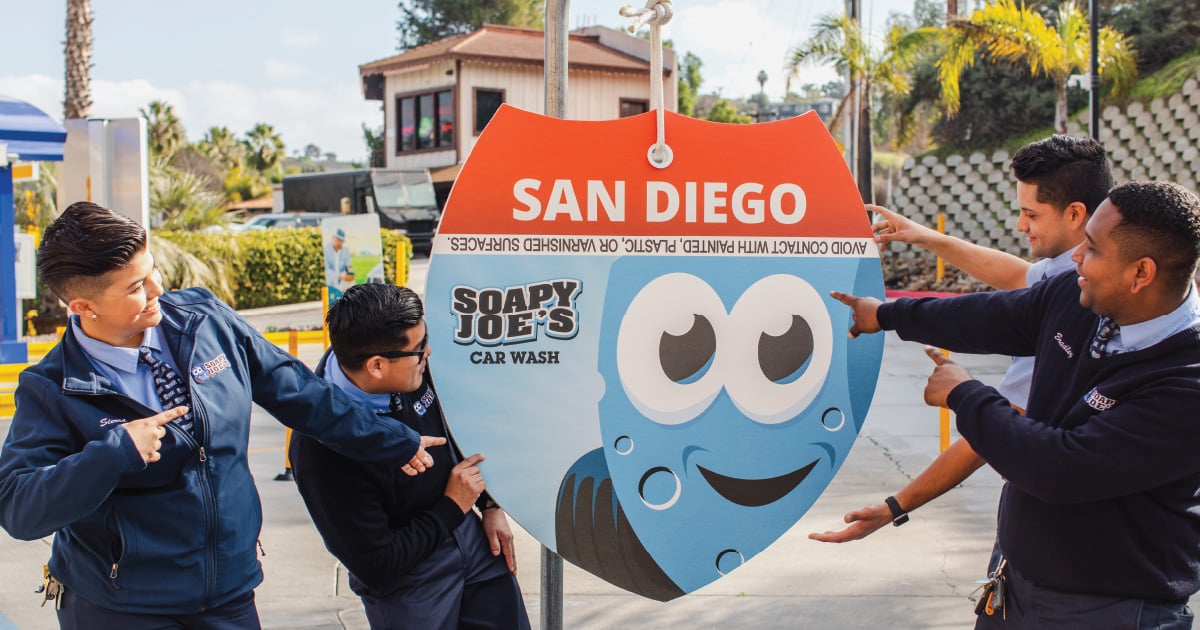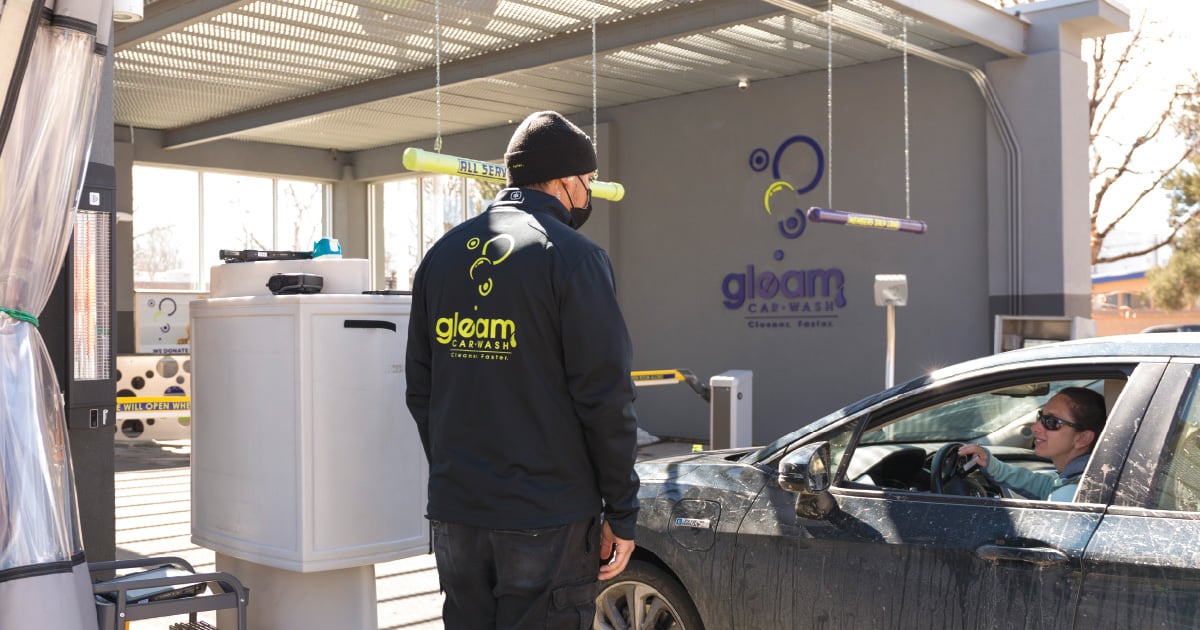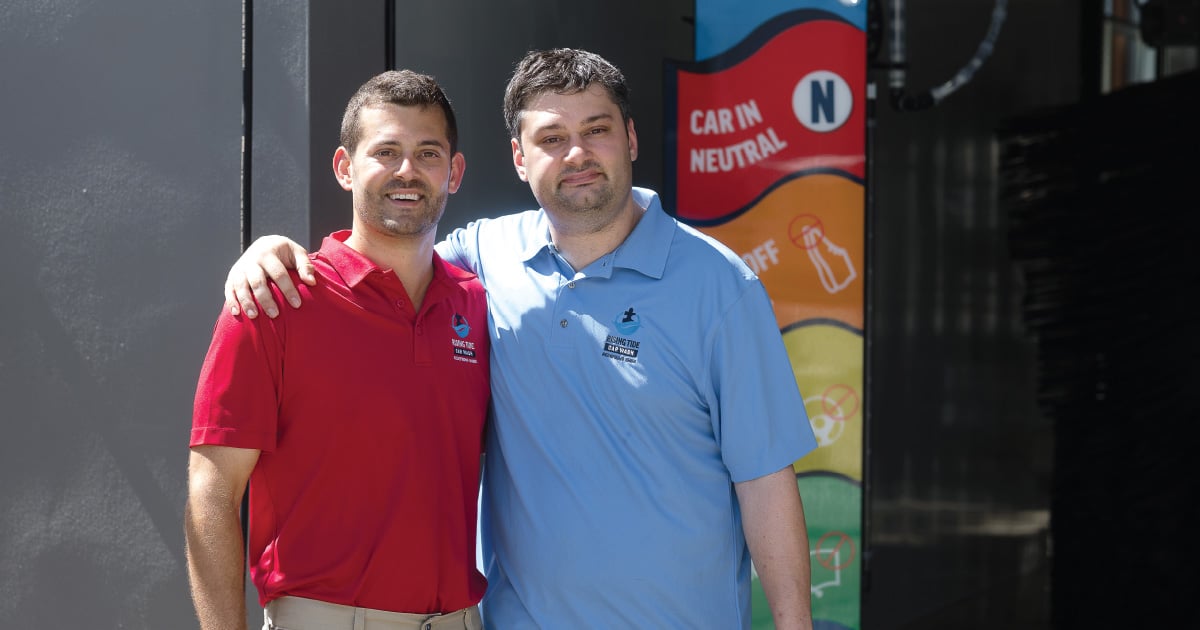
Are You Recruiting with Blinders On?
October 25, 2023
8 minute ReadCar washes with inclusive hiring practices gain an edge.
By Nick Fortuna
As many businesses complain about the labor shortage and high turnover, some ICA members are shedding the blinders when it comes to recruiting. By casting a wider net, these car wash operators are discovering capable, dedicated employees among populations that often go overlooked.
Searching farther and wider
With 20 locations and more than 500 employees, San Diego-based Soapy Joe’s Car Wash usually has several job openings, so Julie Smith, director of human resources, leaves no stone unturned. Smith said Soapy Joe’s stays engaged with the community to access a diverse range of opportunities to source talent.
Soapy Joe’s has relationships with local high schools and colleges, frequently attends on-campus job fairs and often has a representative speak to classes of graduating students, Smith said. College students working part time are great candidates to become managers in training, although that program doesn’t require a college degree, she said.
In addition to posting on job boards, Soapy Joe’s actively recruits on LinkedIn, expanding the pool of candidates to those who aren’t job hunting.
“That’s how we find a lot of our applicants – by not being passive and waiting for them to come,” Smith said.

The company encourages formerly incarcerated jobseekers to apply and works with local nonprofits, which typically provide a case manager for these applicants, Smith said. These jobseekers go through the same application, interview, background-check and onboarding processes as other applicants. Recruiters and direct managers mentor new hires and help them acclimate to the company’s culture, Smith said.
“We definitely don’t think anyone should be restricted from being employed,” she said. “We work with many different community organizations to make sure we’re reaching out to every population in need of employment.”
Soapy Joe’s has established an internship for high-school girls through Girls Rising, a San Diego nonprofit that aims to empower young women through mentorship. Girls gain exposure to opportunities at both the car washes and the corporate offices, Smith said.
Pride Industries, a national nonprofit that connects disabled jobseekers with employers, has been another key partner, Smith said. Case managers interview jobseekers to learn about their capabilities and interests, then refer them to local businesses. Smith said Soapy Joe’s has hired more than three dozen applicants from Pride Industries since 2021, and turnover among that group is only 10%, far below the company’s overall turnover rate.
“That has been one of our most-successful recruiting outlets,” Smith said. “I think some people are afraid to hire from that population because they might not be very familiar with all the capabilities they bring to the table. But our employees from that program are some of our top performers. One of them is our top salesperson every month, and no one can catch him.
“I think it’s all about getting creative and diversifying the populations that you’re hiring from,” Smith said.
Giving people a second chance
At Gleam Car Wash in Denver, one car might get a basic exterior express wash, but the next one might get a high-end detailing package worth $1,000 or more. Offering that wide range of services requires the equivalent of about 32 full-time employees, according to owner Emilie Baratta, who says she’s always on the lookout for hardworking people.
For several years, Gleam Car Wash hired workers from a nearby halfway house, where formerly incarcerated people were restarting their lives, Baratta said. Most were convicted of drug crimes or other low-level offenses and just needed a second chance.
At one point, five residents of the home were employed at Gleam Car Wash, and one is still with the company, having been promoted to manager, Baratta said. Unfortunately, the halfway house, situated on valuable property in a desirable city, was sold last year for redevelopment.
Nevertheless, Baratta said it was very rewarding to offer people a second chance and to see several “completely rebuild their lives and go on to higher-paying jobs.” Gleam Car Wash will look for similar opportunities when it opens its second location in Aurora, Colo., in June, she said.
“If you can come to work, you can clean a car well, you can follow the rules and be respectful, then we’re going to invest in you. That’s been a successful approach for us,” Baratta said.

Aurora has a large immigrant population, including refugees from international conflicts, so Baratta plans to work with nonprofit groups serving that community when the second location opens. She said prior outreach efforts met with limited success because of the long commute to the car wash’s Denver location.
Almost half of Gleam Car Wash’s workers are native Spanish speakers, and some know very little English. Early this year, Baratta found a language instructor who conducts Spanish and English lessons on Zoom, so she began offering those classes to her staff. Employees typically arrive to work an hour early and use a company computer to attend class virtually. Afterward, they clock in and start their shift.
By learning English, her employees can better serve customers and can accelerate their career development. And by learning Spanish, Baratta and her managers can better communicate with employees, she said.
“My employees are unimpressed with my Spanish right now,” she said with a laugh. “We’re doing this to help grow and develop our staff, and the consumer really appreciates it. By investing in language skills, my hope is that we make employees feel valued. It’s not an insignificant cost for the business, but I feel it’s a worthwhile investment.”
Baratta said Gleam Car Wash takes a multipronged approach to recruiting workers. The car wash holds fundraisers for local sports teams, which equates to an opportunity to recruit high school students for part-time work.
She’s also developed relationships with local nonprofits and vocational schools to recruit people on the autism spectrum or facing some kind of disability. Those workers now make up 10% to 20% of her staff, and they’re essential to the business, Baratta said.
It can be really difficult to recruit for this program, Baratta said. “But, if you can find the right people, they are there for life.”
“The ones that stick with us, we’re very proud about,” added Elijah Williams, co-owner at Gleam. “It’s really great watching them grow and be really involved with their jobs.”
Two of Gleam’s longest-term employees were basically non-verbal when they started. “Now, one bosses us around and the other one does training,” Baratta said. “It’s been good for the people, but it’s been good for the business as well.
“You as a business owner can make a big difference in people’s lives and have a segment of your workforce that is just exemplary in terms of showing up on time, with a good attitude, and really appreciating the opportunity to be part of the team,” Baratta said. “We’ve definitely seen huge change in some people’s lives, and it benefits the business to have these tremendously talented, dedicated employees.”
Come for the opportunity, stay for the community
At Rising Tide Car Wash, people on the autism spectrum come for the job opportunity and stay for the community. The Parkland, Fla.-based chain has three locations that employ approximately 100 people in total, including about 80 who are on the autism spectrum.
Tom D’Eri, chief operating officer of Rising Tide, said his family joined the car wash industry in 2013 after evaluating several types of businesses. The goal was to find a place where his younger brother, Andrew, could thrive. Like most people with autism, Andrew was struggling to find his place in the world despite having a lot to offer prospective employers.
On most days, you can find Andrew, 32, cleaning car interiors at Rising Tide. Over the years, more than 100 people with autism have worked for the company before progressing to other jobs in the community, but Andrew will remain an important part of the family business, according to his older brother.
“He’s very happy in his role and has very little interest in doing anything else,” said Tom, 34. “We wouldn’t be in the car wash industry if we hadn’t been trying to find something for Andrew. We felt that the work played to his strengths, and we potentially could employ a lot of people with autism while solving some of the staffing issues that car washes have.
“Those issues have only gotten more pronounced since we started in 2013,” he said.

In the United States, more than 66% of young adults on the autism spectrum are unemployed and not engaged in higher education two years after exiting high school, according to the Autism Society. In addition, almost 42% of young adults with autism never work for pay during their early 20s, the advocacy group said.
Rising Tide has employed more than 250 people with autism since its inception. D’Eri said those workers have been among his best and most-loyal employees, helping the company keep its annual turnover rate at about 20%. Meanwhile, businesses in many industries have been facing record quit rates and annual turnover of 100% or more.
D’Eri said his company’s success suggests that a “broken hiring process” is as much to blame for the labor shortage as any other factor. Rather than simply plastering online job boards with postings, pulling from the same pool of jobseekers as every other business, car wash operators should broaden their search, he said.
Many people who typically aren’t targeted by recruiters, including those who have been incarcerated, have given up looking for work and aren’t on those job boards, D’Eri said. But by extending job opportunities to people who rarely get them, car washes can build hardworking, reliable teams.
“Most of our team members haven’t had jobs before they come here, so they’re really eager to prove themselves,” D’Eri said. “Our business has a lot of strong procedures and processes, and many people with autism gravitate toward those types of structured roles that have a routine, so that’s a big advantage.
“We have a culture that’s very welcoming and accepting,” he said. “I don’t think they stay necessarily out of loyalty to the company; they stay because they’re part of a community here, and that’s the most appealing part of it for them.”
D’Eri said Rising Tide has relationships with local special-education teachers, job coaches and nonprofits that steer job candidates toward Rising Tide. But now that the company is a well-established brand in the community, “a lot of people with autism organically apply,” he said.
The community response to his workforce initiative has been overwhelmingly positive, with many customers bypassing other car washes to support Rising Tide’s mission, D’Eri said. Customer loyalty is a big reason why Rising Tide is able to spend very little on advertising, he said.
Rising Tide typically invests a bit more time training workers with autism, but as long as they have a good attitude and a strong work ethic, they have a good shot at success, D’Eri said.
“Most people have the intellectual ability to do this job, so the No. 1 talent you’re looking for is engagement,” he said. “What you’re really looking for are people who want to do the work, and our employees really want to do the work.”








